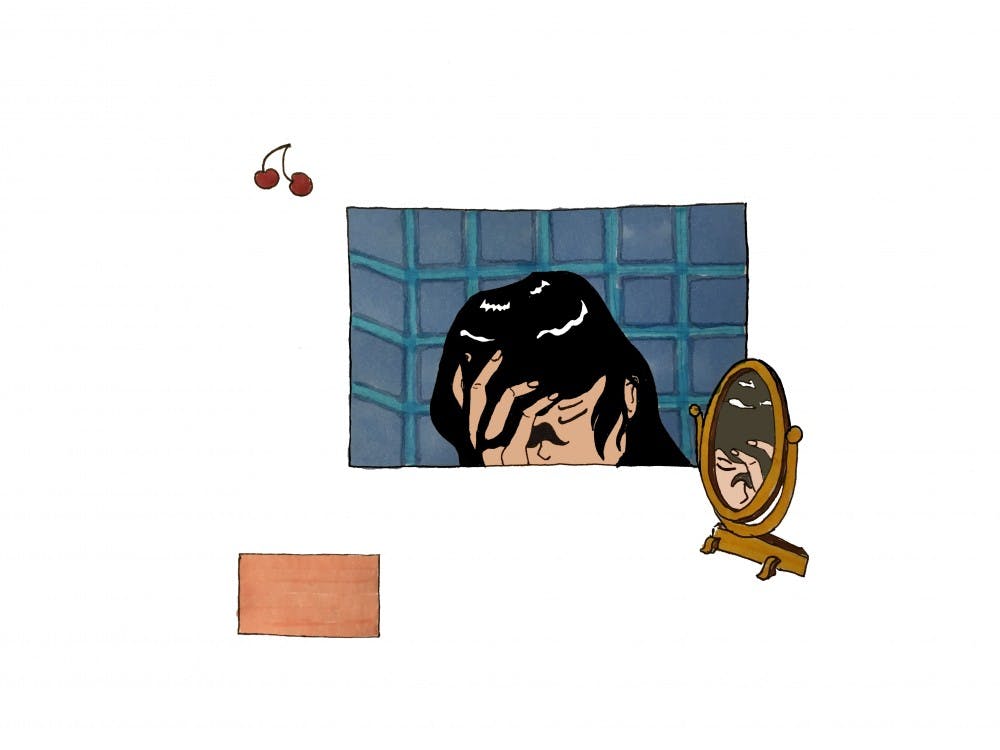My friend Ethan first introduced me to Triathalon by sitting me down last year with next to no context and insisting that I had to listen to a song he had discovered. That song was "South Side" off Triathalon’s 2016 EP, Cold Shower. As I listened to the track, poorly concealing just how much I was enjoying it, Ethan’s grin grew wider and wider. Triathalon’s raw, vulnerable vocals on top of an 808 beat with an incredibly catchy guitar part immediately hooked me in, and I obsessively listened to the song and the rest of the EP over the next week. The band’s component parts may not have been mind–blowing, but the sound their blend created, along with the clever, sparse production, allowed every instrument to breathe and flourish, making them stand out in a sea of vibey, guitar–based lo–fi producers such as Cuco and Kid Bloom.
You can imagine my excitement when the Savannah, GA–based band released their first full album Online last week on the Broken Circles label. The anime album art and lo–fi vibe may tempt you to relegate this album to the level of YouTube 24/7 “study playlist," but rest assured, Triathalon has every intention of being at the forefront of the listener’s attention. Online is an album that was created and exists because of the internet, as one of the band’s main producers, Adam Intrator, moved to New York while his two bandmates stayed in Georgia. Adam mainly wrote on an old Casio keyboard he found at a garage sale, while Chad and Hunter are much more inclined towards the guitar. Despite this geographical separation and difference in musical approach, Online’s sound is remarkably complete and coherent; not a single track sounds out of place on the album and it creates a distinct sentiment while (on the whole) avoids the pothole of simply being “vibey."
The album’s opening track “3” instantly blew me away and displays serious development from their Cold Shower days. It showcases all of the strengths of the previous record and amplifies them to something much more complete. The candid vocal harmonies on top of the warm, synthy production instantly transported me to another, amorphous realm which this whole album occupies. The switch up and understated guitar solo halfway through the song reminded me exactly why I was so excited about this band back in January. It seems that it's upgraded its process and world–building while sacrificing none of the raw emotion of Cold Shower. Other standouts are “Deep End” and “Training Day," both of which have gorgeously rich bass parts: the former is bright and absolutely danceable and the latter is much more ominous and shifting. The half–tempo ending of “Training Day” in particular, an effect borrowed from the end of South Side, is a wonderful tribute to the band's previously most popular song.
Online is full of delightful contradictions which cleverly reflect our everyday interaction with the internet. It's emotionally detached and electronic while also being deeply personal—this is shown most neatly in the transition from rigid, groovy “Couch” to the aptly named, sensual “Butter." This album is perfect to listen to on an introspective commute in the rain, or a lazy Sunday morning in the sun. Its content is versatile and pleasing enough to fit almost any situation while not being too generic or low–key.
My main criticism of this record is that it does trail off around two–thirds of the way in. If I had heard any individual track of the album on my Discover Weekly, it would no doubt have been saved and revisited later. However, one of the album’s main strengths—its coherent vibe and sound—also becomes its downfall, as the musical cohesion after around seven or eight tracks quickly turns into a, nonetheless gorgeously produced, indistinguishable landscape. However, the record retains its intimacy, its attention to detail, and its creation of space extremely well. What this album does have in common with lo–fi study hip–hop music and vaporwave is its ambition to transport one to another headspace. Online takes its listener to a separate realm and, once there, shows them every corner. This world is both utterly detached from reality but also tangibly nostalgic. It's introspective without being self–indulgent and vibey without being nothing–y. Triathalon takes what the vaporwave movement has been trying to do for years and quietly accomplishes it inside one album.

